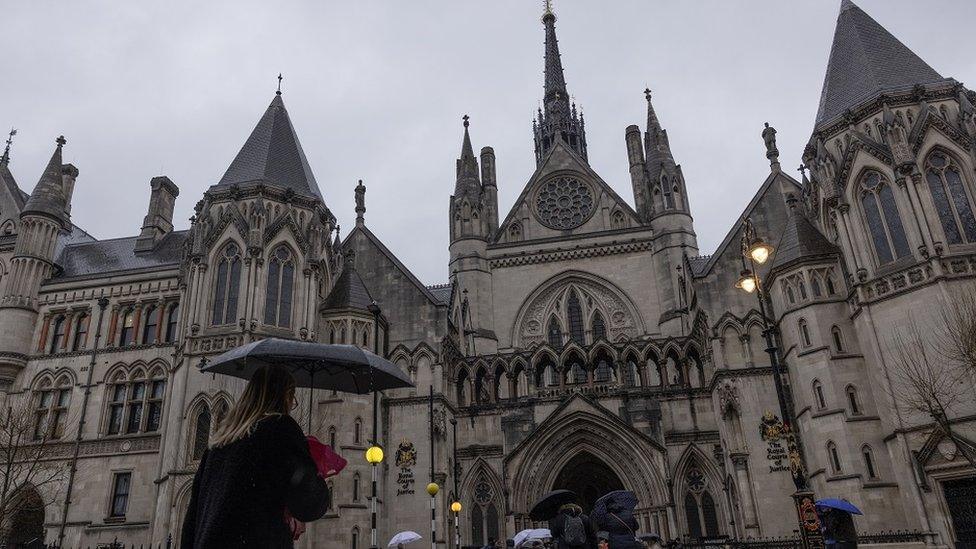Transgender people lose NHS waiting times High Court case
- Published

A group of transgender people have lost their legal case against NHS England over waiting times to get seen by a gender specialist.
The two trans adults and two trans children had tried to get the wait times - more than four years in one of their cases - deemed illegal.
But a High Court judge ruled on Monday, external the waiting times are lawful.
The Good Law Project - which helped to bring the legal action - said it would seek permission to appeal.
The four people brought the legal action against NHS England (NHSE) over the waiting time to get a first appointment with a gender dysphoria specialist.
The claimants argued that NHS England was failing to meet a duty to ensure 92% of patients referred for non-urgent care start treatment within 18 weeks.
They said the waiting times were discriminatory, arguing the delays faced by trans people were longer than for other types of NHS treatment.
But the judge dismissed the claim on several grounds.
Mr Justice Chamberlain said it was "important to acknowledge the serious effects of long waiting times on the first two claimants" - meaning the two children who were awaiting treatment ahead of puberty.
"Their distress and fear, as described by their parents, is particularly affecting because its source lies in their own changing bodies," he said.
"It is a matter of great regret that many other children and adolescents waiting for children's GID [gender identity development] services must face the same distress and fear.
"The question for me, however, is not whether the first two claimants and others in a similar position have been well served by NHSE, but whether NHSE is in breach of the legal duty imposed."
Among the claimants in the case was a girl who was born as a boy but has been living as a girl for more than two years.
After lockdown in 2020, she returned to school as a girl and with a girl's name. The court heard she was happy in her new identity but the happiness was disrupted by the early signs of male puberty, which she wants to delay.
"As her body develops into a man's body, she is becoming increasingly distressed and sad," said her father, who was concerned that she will be left with lifelong mental health issues if she does not access treatment soon.
'Strong and important case'
Gender dysphoria is described by the NHS as a sense of unease that a person may have because of a mismatch between their biological sex and their gender identity. This sense of unease or dissatisfaction may be so intense it can lead to depression and anxiety and have a harmful impact on daily life, the NHS says.
Much of the court's decision centred around the 18-week waiting time target that NHS England had to meet - and what the relevant regulations meant.
As of August 2022, there were more than 26,200 adults waiting for a first appointment at a gender dysphoria clinic, 90% of whom had been waiting more than 18 weeks, the court judgement said.
The judge concluded that the duty on the NHS was "a duty to make arrangements with a view to ensuring that the 18-week standard is met" - but crucially it "does not regard failure to achieve that standard... as a breach".
Judge Mr Justice Chamberlain also looked at the claim of direct discrimination - the argument that waiting times were longer in gender identity services than other parts of NHS England because of discrimination.
But he listed the reasons for the long waiting times in gender identity services, saying it was down to: increased demand; recent clinical controversy surrounding the treatment; the difficulty in recruiting enough specialists despite having funding; and the need to redesign the commissioning model.
"On the contrary, as I have said, the evidence shows that the long waiting times have increased despite NHSE's willingness to increase very substantially the resources available for this service area," he said.
Charity Gendered Intelligence, which aims to increase understanding of gender diversity and improve the lives of trans people, was also named in the legal action as a sixth claimant.
Eva Echo, one of the trans adults who made the claim and waited more than four years for a first appointment, said she was "extremely disappointed" by the court's decision.
"While we recognise the strain NHS England is under, these delays predate Covid and this is about individuals getting important and in some cases, life-saving care," Ms Echo, who is from Birmingham, said.
The Good Law Project also said it and the trans community were deeply disappointed.
"Good Law Project assesses with great care whether to take on a case, and we believed it was a strong and important case to bring," said the charity's legal director, Emma Dearnaley.
"It's our first loss in this space, having previously brought two successful cases. We have decided to appeal this decision."
NHS England - which has opened four new gender dysphoria clinics for adults in the last two years - said: "The NHS notes today's judgement, which saw the claim dismissed on all grounds and acknowledges steps already being taken to reduce waiting times for gender healthcare services."